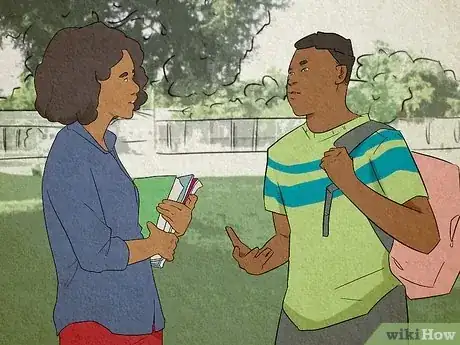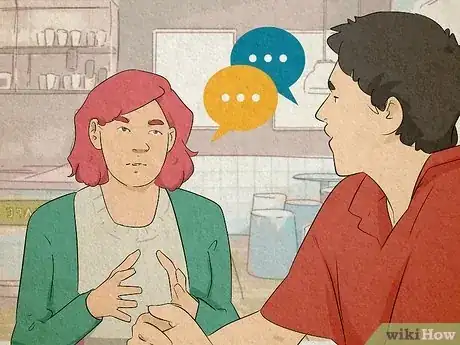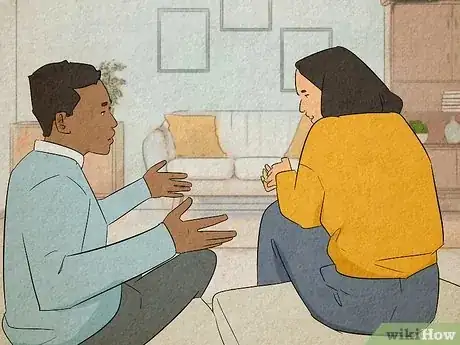This article was co-authored by Katie Styzek. Katie Styzek is a Professional School Counselor for Chicago Public Schools. Katie earned a BS in Elementary Education with a Concentration in Mathematics from the University of Illinois at Urbana-Champaign. She served as a middle school mathematics, science, and social studies teacher for three years prior to becoming a counselor. She holds a Master of Education (M.Ed.) in School Counseling from DePaul University and an MA in Educational Leadership from Northeastern Illinois University. Katie holds an Illinois School Counselor Endorsement License (Type 73 Service Personnel), an Illinois Principal License (formerly Type 75), and an Illinois Elementary Education Teaching License (Type 03, K – 9). She is also Nationally Board Certified in School Counseling from the National Board for Professional Teaching Standards.
This article has been viewed 25,501 times.
Insensitive remarks can be hurtful and harmful, especially if they come from close friends. You may struggle to deal with insensitive remarks from friends, especially if you are feeling offended or upset by their comments. Their remarks may pass judgement on people based on their race, religion, or class. Insensitive remarks can also make assumptions about people and rely on stereotypes or biases. To deal with insensitive remarks from friends, start by deciding if you feel comfortable responding directly to the remarks. Then, confront your friends with tact and honesty. You can also reach out to others for support so you are not dealing with the remarks on your own.
Steps
Deciding How to Respond to Insensitive Remarks
-
1Assess the remarks. Start by taking a moment to assess the remarks that have been made as well as how and when the remarks were made. The type of remarks made may affect how you respond to them. If the remarks are made about you personally, for example, you may more compelled to respond.[1]
- For example, your friends may have said insensitive remarks about a person’s race, gender, or class that you know personally. Or they may have made insensitive remarks about a group of people that you do not know personally.
- Keeping the method in which they were delivered — such as in a Facebook post versus in person — can later help you decide how you wish to respond to the remarks.
-
2Decide if you want to let it go or speak up. Once you have assessed the remarks, make the decision to let the remarks go or speak up about how they make you feel. Think about your level of comfort with your friends and whether you are emotionally able to respond to their comments. Decide if speaking up is important to you or if you would prefer to let the remark go.[2]
- There may also be other factors like who you are around when the remarks are said. If the insensitive remarks are made in front of others who may also be offended, you may decide to speak up because you will have others who will support you.
- If the insensitive remarks are said in the workplace, for example, you may feel more of a responsibility to speak up based on the fact that the remarks are unprofessional and may upset others.
- If the insensitive remarks are said around young people or children, you may feel it is important to speak up because you want to be a good role model and not make it seem like insensitive remarks are okay.
- If the person making the remark is much younger than you are, you may be tempted to let it go based on their age and inexperience, but it's actually better to address it right away. Generally, the earlier the person is made aware of their insensitive remarks, the better chance they have of being open to learning about empathy, compassion, and considering other view points.
Advertisement -
3React to the remarks based on your judgement. Think about whether you are able to respond to the remarks in the moment, in front of your friends. If you think you will react emotionally and not from a clear, logical place, you might want to wait until you have had time to calm down and think through your response. Or you may decide to let the remarks go and speak up the next time they are said.
- You may also decide to address the remarks later, after you have had time to think about your response. You may have a response that is more calm and clear if you take some time to process the remarks and avoid getting drawn into an emotional argument in which you might say something you regret.
- It is also possible you will be so shocked in the moment you won't know how to react, or you won't realize until later the full gravity of their remark.
Confronting Friends Who Say Insensitive Things
-
1Talk to friends in person. Try to have a discussion about your friend’s insensitive remarks in person, face to face. Confronting friends in a text, over the phone, or on social media can make it difficult for you to have a meaningful discussion. Set up a time where you can talk to friends in person so you can interact in an open, honest way.[3]
- If it is not possible to talk to friends about their insensitive remarks in person, you may send them a private message online with your thoughts. Commenting on a friend’s remarks on a public forum, such as Facebook, can lead to more conflict and may make it difficult for you to get your points across in a helpful way.
- Responding in a comment on someone's post, for instance, makes the conversation public and other people may become involved in the conversation as well. Your friend may also become defensive and be less likely to listen if they feel you are attacking or embarrassing them in a public forum. Try a private, direct message or text instead. You might say, "Can I talk to you about your Facebook post?"
-
2Respond to the comment, not to the person. If you decide to speak up and address the insensitive remarks head on, start by responding directly to the comments made, not the person who made them. This means focusing on what was said, rather than judging or attacking the person who said them. Having this kind of approach will allow you to have a discussion with the person about their words without launching into a personal attack. Personal attacks on the person often lead to anger and conflict.[4]
- For example, you may say to the person, “I am uncomfortable with what you just said. I do not think your remarks are sensitive or fair. I am not upset at you as a person, but I am bothered by your comments.”
- Avoid saying something judgmental, like "Only a racist person would have that opinion."
- Responding calmly and with tact can help you learn to be assertive and set boundaries with others. Speaking up against what you believe is insensitive is a good skill to have regardless of age.
-
3Explain how the remarks make you feel. Focus on your reaction to your friend’s comment. Use “I” statements to express how the remarks make you feel. Let your friends know why and how their remarks bother you.[5] Call them out in a way that focuses on your perspective of their words and why they may be hurtful or harmful.[6]
- For example, you may say, “I want you to know that your remarks make me feel hurt and upset. I am offended by your comments because they stereotype black people.” Or you may say, “I am feeling angry and upset by your remarks. I feel as though your remarks are insensitive and hurtful to women.”
-
4Offer to educate and share knowledge. As part of your response, you can offer to educate your friends and share knowledge. Often, insensitive remarks come from ignorance and a lack of knowledge about history or current events. Offer more information about why a remark may be insensitive to friends who are interested, especially if the discussion is going well and they seem to be listening to what you have to say.[7]
- For example, you may discuss the racial history behind an insensitive remark that is made. Or you may send your friends links to information online that discuss why a remark may be insensitive.
- Do not try to force any knowledge on your friends if they do not seem interested. Sometimes simply expressing your dislike for their remarks is enough of a response.
-
5Be prepared to agree to disagree. Though you may hope that your friends come around and support your perspective, this may not always happen. Be prepared to agree to disagree with your friends, even after you have expressed your discomfort with their remarks. It may take time for them to accept your point of view, or they may not change what they say in the future. What matters is that you spoke up and expressed your discomfort to your friends.
- If you are bothered that your friends do not change what they say, even after you have expressed your disdain, you may decide to distance yourself from them.
- You may also try to avoid talking about subjects with them that could lead to insensitive remarks, especially if you know their remarks will bother you or upset you. You may decide to avoid talking about politics and religion with this person, for example, because you know that it always leads to a heated argument.
Reaching Out to Others for Support
-
1Speak to like-minded friends. Dealing with insensitive remarks from friends can be draining, especially if you do not agree with what your friends are saying. Try to find friends who are like-minded and who will listen to you discuss your feelings about the remarks. Maybe you have friends in another social circle who may be sympathetic to your perspective. Or maybe there is one friend in your friend group who feels similar to you.[8]
- You may seek out like-minded friends so you can talk together and share your feelings. This could help you cope with the insensitive remarks and feel less alone in your point of view.
- These friends might have a similar opinion of the remarks and wish to join you in speaking up. If you know that the person in question often dismisses your concerns or says you're just being sensitive, being approached by multiple people may show them that you are not the only one who is offended by their behavior. Approaching the person as a group will send the message that those types of remarks will not be tolerated in the friend group.
-
2Lean on others who can relate to your experience. You may also look to family members, coworkers, and other friends who can relate to your discomfort and anger at insensitive remarks. Confide in others who can relate to what you are dealing with so you feel less alone and so you can feel supported.
- Maybe you have a family member who has experienced insensitive remarks from those around them in the past. Or perhaps you have coworkers who are also dealing with insensitive remarks from friends.
- Organizations may provide you with more information about how to go about addressing insensitive remarks. The Anti-Defamation League, for instance, can provide you with assistance in dealing with anti-semitism.
-
3Talk to a mentor or parent. If the insensitive remarks from friends are really bothering you and you are feeling anxious or stressed, you may seek advice from a mentor or a parent. This may a good option if your friends are young and you are not sure how to confront them. Talking to a mentor or parent can help you feel less upset and allow you to express your feelings without judgement. It can also give you the confidence to then confront your friends directly and express your feelings about their remarks.[9]
- For example, you may speak to your parents for advice on how to handle the situation. Or you may talk to your teachers, coaches, or other community members for guidance on how to deal with insensitive remarks from friends.
References
- ↑ https://www.splcenter.org/20150126/speak-responding-everyday-bigotry#everyday-bigotry
- ↑ Katie Styzek. Professional School Counselor. Expert Interview. 28 October 2020.
- ↑ https://www.splcenter.org/20150126/speak-responding-everyday-bigotry#everyday-bigotry
- ↑ https://www.splcenter.org/20150126/speak-responding-everyday-bigotry#everyday-bigotry
- ↑ Katie Styzek. Professional School Counselor. Expert Interview. 28 October 2020.
- ↑ https://www.splcenter.org/20150126/speak-responding-everyday-bigotry#everyday-bigotry
- ↑ https://www.splcenter.org/20150126/speak-responding-everyday-bigotry#everyday-bigotry
- ↑ https://www.splcenter.org/20150126/speak-responding-everyday-bigotry#everyday-bigotry
- ↑ Katie Styzek. Professional School Counselor. Expert Interview. 28 October 2020.







































































